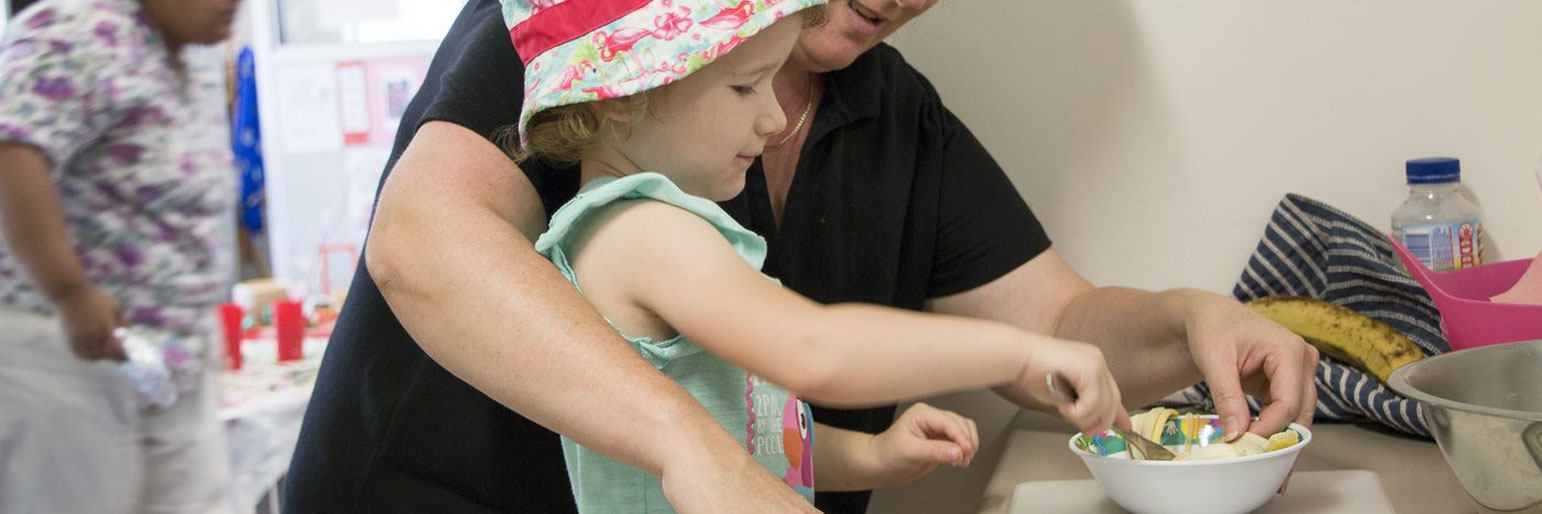Healthy eating – snacktime
Talking together
Eating together is a way to build connection and belonging and an opportunity to model healthy eating behaviours for children and families.

Activity
At playgroup you could provide a healthy snack, plan a snack-making activity, or ask families to bring a healthy snack of their choice. This could be as simple as a piece of fruit being cut up and shared.
What you'll need
- Cutting boards
- Child safe knives
- Bowls
- Cups
- Jugs
- Tongs
- Disposable gloves
- Scrap bowls
- Table and chairs or a large mat
- Large tub for washing up
- Dish draining rack
- Sponges
- Tea towels
- Drinking water
Words to use
- Bowl, dish, spoon, plates, utensils, table, mat, floor, chairs
- Sitting
- More/less, enough, too much
- Chop, cut, knife
- Whole/half/quarter, piece
- Slippery, soft/hard, dry/wet
- Wash/dry
- Peel, grate, pour
- Sweet, sour, mushy, soft, crunchy, fresh,
Questions to discuss
- How hungry are you?
- Do we need a bigger dish?
- Where will we sit?
- Who is going to eat?
Learning through play
Ways to develop numeracy through play
- Talk about the shapes and patterns of food.
- Can you find the star inside of an apple by cutting it horizontally across the middle? (Grate or slightly soften apple before giving it to under 4s).
- Patterns – Make some fruit kebabs.
- Make some shape sandwiches using biscuit cutters.
- Talk about fractions – Can you cut the orange in half or quarters?
- Estimation – Do you think we have enough fruit for everyone?
- Measure and weigh ingredients to make some fruit muffins for snack time.
- When children help to get organised for snack time, they are learning to quantify and compare their worlds.
- Ask children to set the table – How many bowls and cups do we need today?
- Ask children to wash their bowls and cups and sort into groups to put away.
Ways to develop literacy through play
- Sharing food can be a great opportunity to talk about what happened during the day, or what might happen tomorrow.
- Talk about the colour, taste, feel and smell of the food.
- Talk about different food groups
- Refer to the Australian Guide to Healthy Eating and print off posters to prompt discussions
- Make your own poster of healthy food and ‘sometimes’ food; draw or cut out pictures from magazines or catalogues.
- Talk about food that children like to eat – what do they like about it?
- Cooking – use lots of language to describe what you are doing eg mixing, stirring, pouring etc. Talk to the children about what happens when you add liquids to dry ingredients.
- Read books about food eg The Very Hungry Caterpillar.
Extensions and variations to this activity
- If the weather is nice you could pack a picnic and sit outside, or go to the park and share food together.
- Cooking – make some pikelets or fruit muffins – measure and weigh the ingredients.
- Grouping – make a graph of fruit that children like. Make a poster of food that we like.
- Have a Teddy Bears Picnic.
- Have a shared lunch or celebration – ask families to bring a plate of food to share (be aware of allergies).
- Make some fresh orange juice.
- Make a fruit smoothie.
- Make some frozen fruit ice blocks.
- Try eating a rainbow of different coloured fruit and vegetables.
- Plant some herbs and vegetables and watch them grow.
- See if your local council runs healthy eating sessions, or can have someone come present at Playgroup.
Supporting parent engagement in play
Play prompts:
- Have you washed your hands?
- What are we eating?
- Are you thirsty? Can you pour yourself a drink of water?
- Let’s cut this orange in half, then into quarters.
Parents or carers can:
- Comment on what their children are doing (say what they see).
- Talk in their home language.
- Use literacy and numeracy words (see words to use section above).
- Bring a piece of fruit to share.
- Help their child to prepare the snack or set up the table.
- Support their child to wash their hands – model good hygiene practices.
- Model healthy food choices.
- Share recipes from home.
You can help families by:
- Modelling what you want them to do.
- Talking to them about the focus of the activity and what children might be learning.
- Writing up words that go with the activity.
- Making suggestions on what families can do at home.
Related Great Start activities
Great Start activities are for parents and carers to do with their children.


